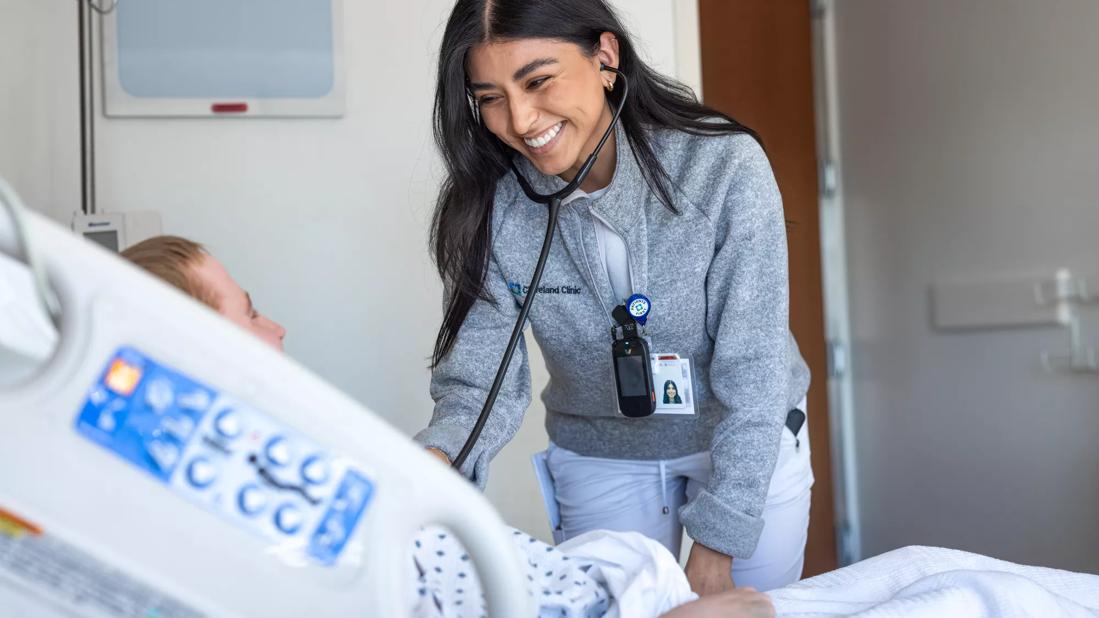Hospital earns seven exemplars from the Magnet Recognition Program®

Janet Schuster, DNP, RN, NEA-BC has reason to be proud of Cleveland Clinic Lutheran Hospital, the 203-bed acute care facility where she serves as chief nursing officer.
Advertisement
Cleveland Clinic is a non-profit academic medical center. Advertising on our site helps support our mission. We do not endorse non-Cleveland Clinic products or services. Policy
“We are small but mighty,” says Schuster, and the American Nurses Credentialing Center (ANCC) agrees. In September 2021, Lutheran Hospital earned its first Magnet® designation, as well as seven exemplars for outstanding work in three areas:
“Our data shows we are consistently doing well with nursing sensitive indicators and patient experience,” says Annie Fitz, MSN, MBA, RN, NE-BC, CCM, Nursing Quality Program Manager and Magnet Program Coordinator at Lutheran Hospital. “We achieve it through teamwork.”
All seven exemplars fell under the Magnet exemplary professional practice component, defined by the ANCC as “a comprehensive understanding of the role of nursing; the application of that role with patients, families, communities and the interdisciplinary team; and the application of new knowledge and evidence.”
Lutheran Hospital outperformed national benchmarks for hospital-acquired pressure injury (HAPI), central line-associated bloodstream infections (CLABSI), catheter-associated urinary tract infection (CAUTI) and unplanned postoperative transfers/admissions.
“There is such a big emphasis on hospital-acquired infection prevention here,” says Fitz. “Our clinical nurses collaborate with our infection preventionist, who is a nurse, and our clinical nurse specialist.” The team relies on evidence-based care bundles, nurse-driven protocols and other tools to prevent infections. When they do occur, the team jumps into action to discover why and thwart further infections.
Advertisement
For example, after two patients were diagnosed with CLABSIs in the second quarter of 2019, the infection preventionist and clinical nurse specialist re-educated nurses on how to properly maintain a central line. They created a sheet including the steps for meticulous line care, educated staff on chlorhexidine gluconate baths for ICU patients with central lines, developed a vascular access poster review and quiz, initiated infection prevention rounds and more. Lutheran Hospital met its goal of zero CLABSIs in the three quarters following the intervention.
In addition to having outstanding clinical indicator data, Lutheran Hospital also outperformed national benchmarks in the ambulatory patient satisfaction category for patient education, safety and responsiveness.
“We have done a lot of work around responsiveness in ambulatory areas, which include the Emergency Department, our Wound Center and our Chronic Care Center,” says Fitz. “They have good teams who work very well together.”
For instance, the ED includes physicians, physician assistants, nurse practitioners, clinical nurses, health unit coordinators, paramedics and clinical technicians who collaborate to provide quality patient care.
“If there is a blip in something like nursing communication, it’s addressed with the whole team,” says Schuster. In addition, the ED Operations Council, which includes the department’s nurse manager, routinely discusses responsiveness and other patient satisfaction indicators.
Fitz and Schuster want nursing colleagues across the country at smaller hospitals to know they can achieve Magnet status, too.
Advertisement
“You always hear about larger institutes and academic hospitals that obtain Magnet status,” says Fitz. “We have shown evidence that smaller hospitals can be just as effective at nursing excellence.”
Schuster encourages other CNOs to have confidence in their staff and support team members throughout the Magnet journey as they complete documentation and site visits. “If you’re doing a good job, then have the confidence to share your story,” she says.
Earning Magnet recognition takes a lot of work, but it’s well worth it, she adds.
“Magnet designation validates the work we know we do every day for our patients and for one another,” says Schuster. “It recognizes our contribution to a healthy community.”
Advertisement
Advertisement

Planning continues with critical, patient-focused input from nursing teams

Strengthening care through targeted resources and frontline voices

Embracing generational differences to create strong nursing teams

CRNA careers offer challenge and reward

An unexpected health scare provides a potent reminder of what patients need most from their caregivers

Cleveland Clinic Abu Dhabi initiative reduces ICU admissions and strengthens caregiver collaboration

Veteran nurse blends compassion, cutting-edge transplant training and military tradition to elevate patient care

Embrace coaching and other tips to be a stronger leader